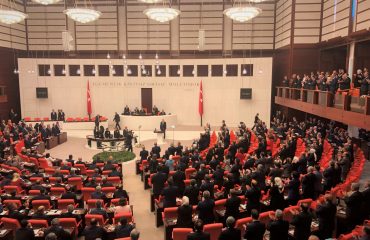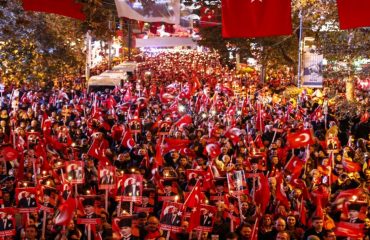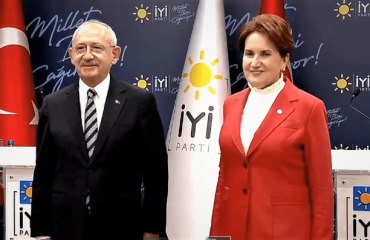

An unprecedented siege is being applied to opposition’s popular İstanbul Mayor İmamoğlu to prevent his presidential candidacy. Yavaş is aware that he will be next in line if this strategy works, and is showing solidarity.
President Recep Tayyip Erdoğan is seeking to run for office once again by securing a parliamentary majority and exploiting a constitutional ambiguity. The opposition Republican People’s Party (CHP) has two formidable potential candidates to challenge him: Mansur Yavaş, the Metropolitan Mayor of Ankara, and Ekrem İmamoğlu, the Metropolitan Mayor of Istanbul.
While Erdoğan has thus far refrained from targeting Yavaş, he appears determined to make İmamoğlu’s political life unbearable.
There seems to be a concerted effort mobilizing virtually all state resources—both official and unofficial—to prevent İmamoğlu from becoming a candidate. Indicators suggest that Yavaş will be the next target, but the immediate priority is to eliminate İmamoğlu from contention.
The systematic campaign against İmamoğlu
Following multiple investigations and lawsuits against İmamoğlu that could potentially result in imprisonment and a political ban, he now faces scrutiny over his university diploma. This appears to be a contingency plan: if the lawsuits fail to secure a political ban, they can attempt to disqualify him on educational grounds, as Turkish law requires presidential candidates to hold a university degree. Ironically, similar allegations were once leveled against Erdoğan, claiming he lacked the necessary university credentials to run for president.
The accusations against İmamoğlu initially claimed he was not a university graduate and that his diploma was fraudulent. When these allegations proved unsustainable, critics pivoted to challenging the validity of his 1994 transfer from Girne American University in Cyprus to Istanbul University’s English Business Administration department, citing equivalency issues.
İmamoğlu is scheduled to provide testimony on March 5. The campaign has escalated to such extremes that AKP member Mücahit Birinci has suggested invalidating İmamoğlu’s shortened military service (a privilege granted to university graduates), asserting he should complete the remaining service as a regular conscript.
The situation has become so absurd that one might sarcastically suggest they’ll soon instruct bakeries to refuse selling bread to İmamoğlu—a Turkish expression indicating an attempt to make someone’s life completely impossible.
Yavaş’s show of solidarity
This level of political siege is unprecedented in Türkiye’s political landscape, where many believed they had already witnessed every possible political maneuver.
These legal challenges force the CHP to focus primarily on defensive measures, while simultaneously intensifying the party’s internal factional divisions that persist regardless.
However, Yavaş’s February 24 statements demonstrate his clear understanding that if the government succeeds in eliminating İmamoğlu from the presidential race, he will become the next target.
Addressing the actions against İmamoğlu, Yavaş stated, “No one should underestimate the solidarity among CHP mayors and parliamentarians,” adding, “We will stand united against such unjust practices until the end.”
Yavaş’s criticism of government-appointed trustees in his statement should also be interpreted as support that challenges the “urban consensus” accusations directed at İmamoğlu.
İmamoğlu’s strategy: Seeking party-wide support
İmamoğlu will address CHP leadership and parliamentarians in Ankara on February 27. He plans to express gratitude to the CHP Parliamentary Group—comprising 133 members—for supporting him with only 17 defections, despite predictions that 50-60 members would oppose him. He will also request their continued voting support.
Given that Yavaş has—justifiably—declared he will not be a candidate, one might question the purpose of this appeal for support.
İmamoğlu aims to secure the votes and explicit backing of 1 million of the CHP’s 1.6 million members. While 800,000 votes—half the membership—would be acceptable, obtaining support from 1 million party members would provide breathing room not only for İmamoğlu but also for the party’s headquarters.
According to the Constitution, there are three ways to qualify as a presidential candidate: nomination by parliamentary party groups, nomination by political parties that received at least 5 percent of the total valid votes in the most recent general elections (either individually or in coalition), or by collecting signatures from at least 100,000 eligible voters.
For İmamoğlu’s candidacy to become official, he will need formal nomination through signatures from CHP parliamentarians after the election calendar is officially announced by the electoral authorities.
Surge in investigations against CHP: Target is İstanbul’s İmamoğlu


